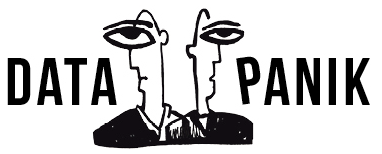Een greep uit de Engelstalige boeken die in de loop van 2015 verschenen zijn rond privacy en surveillance.
 Finn Brunton en Helen Nissenbaum: Obfuscation. A User’s Guide for Privacy and Protest (MIT Press 2015)
Finn Brunton en Helen Nissenbaum: Obfuscation. A User’s Guide for Privacy and Protest (MIT Press 2015)
In haar nieuwe boek Obfuscation beschrijft de filosofe Helen Nissenbaum samen met Finn Brunton verschillende manieren om in verzet te komen tegen datahongerige organisaties. Obfuscation betekent zoveel als verwarring zaaien. Brunton en Nissenbaum zien dat als een mogelijk antwoord op de alomtegenwoordige surveillance van burgers en consumenten door overheden en bedrijven. “Als je in de moderne wereld wilt leven zonder onderwerp te zijn van indringende digitale surveillance, dan is verwarring zaaien een manier om zand in de raderen te strooien, tijd te kopen en op te gaan in een kluwen van signalen.”
Maurits Marijn vond in een recensie voor de Correspondent “Obfuscation een van de beste boeken over privacy en surveillance die ik de afgelopen tijd las. Het vindt een ongewone balans tussen filosofische diepgang en aansprekende, concrete voorbeelden. Het is deels analyse, deels pamflet. Het is vlot geschreven én snel gelezen.”
We konden het zelf niet beter gezegd hebben.
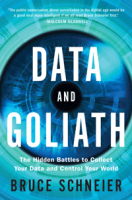 Bruce Schneier: Data and Goliath. The Hidden Battles to Collect Your Data and Control Your World. W.W. Norton & Company, 2015
Bruce Schneier: Data and Goliath. The Hidden Battles to Collect Your Data and Control Your World. W.W. Norton & Company, 2015
You are under surveillance right now. Your cell phone provider tracks your location and knows who’s with you. Your online and in-store purchasing patterns are recorded, and reveal if you’re unemployed, sick, or pregnant. Your e-mails and texts expose your intimate and casual friends. Google knows what you’re thinking because it saves your private searches. Facebook can determine your sexual orientation without you ever mentioning it.
The powers that surveil us do more than simply store this information. Corporations use surveillance to manipulate not only the news articles and advertisements we each see, but also the prices we’re offered. Governments use surveillance to discriminate, censor, chill free speech, and put people in danger worldwide. And both sides share this information with each other or, even worse, lose it to cybercriminals in huge data breaches.
Much of this is voluntary: we cooperate with corporate surveillance because it promises us convenience, and we submit to government surveillance because it promises us protection. The result is a mass surveillance society of our own making. But have we given up more than we’ve gained? In Data and Goliath, security expert Bruce Schneier offers another path, one that values both security and privacy. He shows us exactly what we can do to reform our government surveillance programs and shake up surveillance-based business models, while also providing tips for you to protect your privacy every day. You’ll never look at your phone, your computer, your credit cards, or even your car in the same way again.
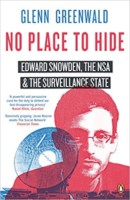 Glenn Greenwald: No Place to Hide: Edward Snowden, the NSA, and the U.S. Surveillance State (Penguin Publ. 2015)
Glenn Greenwald: No Place to Hide: Edward Snowden, the NSA, and the U.S. Surveillance State (Penguin Publ. 2015)
The lessons of courage and integrity contained within the pages of No Place to Hide, as exemplified by Edward Snowden, Greenwald as well as the journalists, editors and publishers who supported their efforts in shining a light into the darkest corners of the most powerful government in the world, make this a must read for any truly privacy-conscious individual. The book reads almost like a thriller, but contains a morality tale about the personal courage required of Snowden and Greenwald and his colleagues to expose government wrongdoing while risking their own lives and liberties in doing so. It is the tale that started this debate. This is easily one of the best book on privacy there is.
 Shane Harris: @War. The Rise of the Military-Internet Complex (Mariner Books, 2015)
Shane Harris: @War. The Rise of the Military-Internet Complex (Mariner Books, 2015)
This book takes you deep inside the government’s surveillance and cyber operations to give an unsparing look at what the NSA and other agencies are really doing with all of our data. In the age of abstract Snowden documents, @War actually introduces you to the people running America’s electronic spying machine, and offers invaluable insights into how their ambition and turf battles impact our financial security, our privacy, and our freedom.
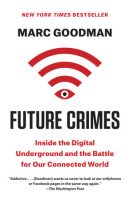 Marc Goodman: Future Crimes: Everything Is Connected, Everyone Is Vulnerable and What We Can Do About It (Doubleday, 2015 – paperback: Anchor, 2016)
Marc Goodman: Future Crimes: Everything Is Connected, Everyone Is Vulnerable and What We Can Do About It (Doubleday, 2015 – paperback: Anchor, 2016)
Hackers die je medisch dossier veranderen, zodat je de verkeerde bloedtransfusie krijgt. Een veiligheidsexpert die, tijdens de vlucht, via zijn telefoon de boordcomputer manipuleert. Criminelen die je bankrekening plunderen terwijl je bankafschriften onveranderd blijven. Terroristische organisaties die cybercrime gebruiken om hun aanslagen te financieren. Dat, en nog veel meer digitale ellende, staat ons volgens Marc Goodman te wachten. Future Crimes beschrijft de risico’s van een wereld waarin alles met internet verbonden is. Het boek staat bol van concrete voorbeelden van hacks en de gevaren van het Internet of Things, waarbij ook je koelkast en haardroger online gaan. De online economie en maatschappij staan open voor iedereen, maar vooral voor criminelen. En de politie hobbelt achter de feiten aan.
– interview bij NRC
– TED Talk
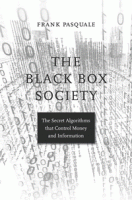 Frank Pasquale: The Black Box Society. The Secret Algorithms that Control Money and Information (Harvard University Press, 2015)
Frank Pasquale: The Black Box Society. The Secret Algorithms that Control Money and Information (Harvard University Press, 2015)
Every day, corporations are connecting the dots about our personal behavior—silently scrutinizing clues left behind by our work habits and Internet use. The data compiled and portraits created are incredibly detailed, to the point of being invasive. But who connects the dots about what firms are doing with this information? The Black Box Society argues that we all need to be able to do so—and to set limits on how big data affects our lives.
Frank Pasquale exposes how powerful interests abuse secrecy for profit and explains ways to rein them in. Demanding transparency is only the first step. An intelligible society would assure that key decisions of its most important firms are fair, nondiscriminatory, and open to criticism. Silicon Valley and Wall Street need to accept as much accountability as they impose on others.
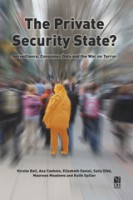 Kirstie Ball, Ana Canhoto, Elizabeth Daniel, Sally Dibb, Maureen Meadows and Keith Spiller: The Private Security State? Surveillance, Consumer Data and the War on Terror, CBS Press, Frederiksberg, 2015.
Kirstie Ball, Ana Canhoto, Elizabeth Daniel, Sally Dibb, Maureen Meadows and Keith Spiller: The Private Security State? Surveillance, Consumer Data and the War on Terror, CBS Press, Frederiksberg, 2015.
The last decade has witnessed the emergence of a surveillance-industrial complex as securitised data about customers begins to flow between the private sector and government. Through detailed empirical analysis The Private Security State? questions how private sector organizations achieve compliance with demands for customer data. Whilst others have argued that diffused security arrangements de-politicises it, this book shows that national security becomes re-politicised as it re-surfaces in the politics of production within the business enterprise.
Review bij Surveillance Studies
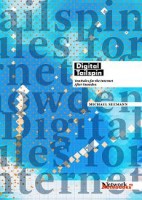 Michael Seemann: Digital Tailspin: Ten Rules for the Internet After Snowden (Network Notebooks 09, Institute of Network Cultures 2015).
Michael Seemann: Digital Tailspin: Ten Rules for the Internet After Snowden (Network Notebooks 09, Institute of Network Cultures 2015).
Privacy, copyright, classified documents and state secrets, but also spontaneous network phenomena like flash mobs and hashtag revolutions, reveal one thing – we lost control over the digital world. We experience a digital tailspin, or as Michael Seemann calls it: a loss of control or Kontrollverlust. Data we never knew existed is finding paths that were not intended and reveals information that we would never have thought of on our own. Traditional institutions and concepts of freedom are threatened by this digital tailspin. But that doesn’t mean we are lost. A new game emerges, where a different set of rules applies. To take part, we need to embrace a new way of thinking and a radical new ethics – we need to search for freedom in completely different places. While the Old Game depended upon top-down hierarchies and a trust in the protective power of state justice systems, the New Game asks you to let go of all these certainties. Strategies to play the game of digital tailspin rely on flexibility, openness, transparency and what is dubbed ‘antifragility’.
Lees hier het gratis e-book of bestel en print exemplaar.
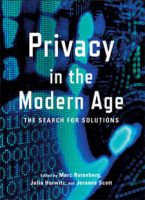 Marc Rotenberg, Julia Horwitz, Jeramie Scott (eds.): Privacy in the Modern Age: The Search for Solutions (New York, The New Press, 2015)
Marc Rotenberg, Julia Horwitz, Jeramie Scott (eds.): Privacy in the Modern Age: The Search for Solutions (New York, The New Press, 2015)
The threats to privacy are well known: the National Security Agency tracks our phone calls, Google records where we go online and how we set our thermostats, Facebook changes our privacy settings when it wishes, Target gets hacked and loses control of our credit card information, our medical records are available for sale to strangers, our children are fingerprinted and their every test score saved for posterity, and small robots patrol our schoolyards while drones may soon fill our skies.
The contributors to this anthology don’t simply describe these problems or warn about the loss of privacy- they propose solutions. They look closely at business practices, public policy, and technology design and ask, “Should this continue? Is there a better approach?” They take seriously the dictum of Thomas Edison: “What one creates with his hand, he should control with his head.” It’s a new approach to the privacy debate, one that assumes privacy is worth protecting, that there are solutions to be found, and that the future is not yet known. This volume will be an essential reference for policy makers and researchers, journalists and scholars, and others looking for answers to one of the biggest challenges of our modern day. The premise is clear: there’s a problem- let’s find a solution.

